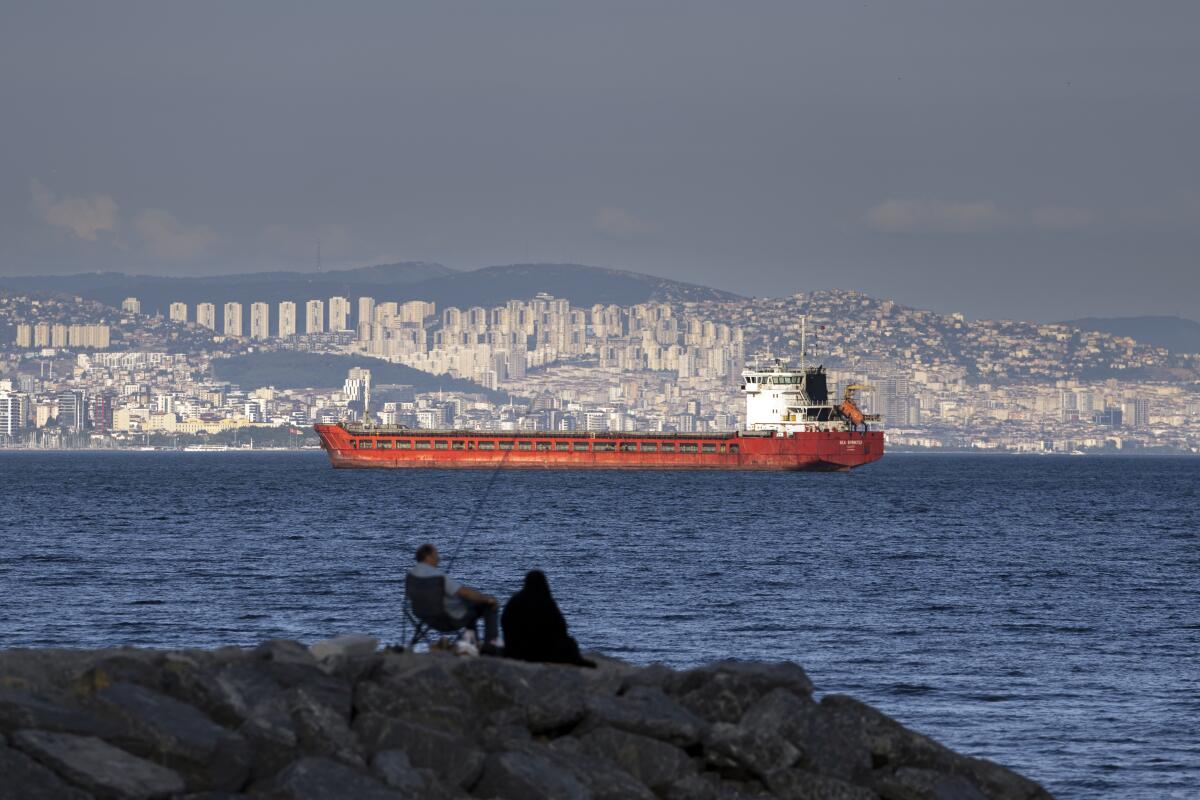‘A beacon of hope’: Ukraine, Russia sign grain export deals

- Share via
ISTANBUL — Russia and Ukraine signed separate agreements Friday with Turkey and the United Nations, clearing the way for exporting millions of tons of desperately needed Ukrainian grain as well as Russian grain and fertilizer, ending a wartime standoff that had threatened food security around the globe.
The deal will enable Ukraine — one of the world’s key breadbaskets — to export 22 million tons of grain and other agricultural products that have been stuck in Black Sea ports due toRussia’s invasion. U.N. Secretary-General António Guterres called it “a beacon of hope” for millions of hungry people who have faced huge increases in food costs.
“A deal that allows grain to leave Black Sea ports is nothing short of lifesaving for people across the world who are struggling to feed their families,” said Red Cross Director-General Robert Mardini, who noted that over the last six months prices for food staples have risen 187% in Sudan, 86% in Syria, 60% in Yemen and 54% in Ethiopia, all of which face dire food shortages.
Russian Defense Minister Sergei Shoigu and Ukrainian Infrastructure Minister Oleksandr Kubrakov signed separate, identical deals with Guterres and Turkish Defense Minister Hulusi Akar at a ceremony in Istanbul that was witnessed by Turkish President Recep Tayyip Erdogan.
“Today, there is a beacon on the Black Sea,” Guterres said. “A beacon of hope, a beacon of possibility, a beacon of relief in a world that needs it more than ever.
“You have overcome obstacles and put aside differences to pave the way for an initiative that will serve the common interests of all,” he told the Russian and Ukrainian envoys.
Guterres described the deal as an unprecedented agreement between two parties engaged in a bloody conflict. Erdogan said he hoped the initiative would be “a new turning point that will revive hopes for peace.”
As the deal was being brokered, Russia continued to wage war on Ukraine. Emergency workers recovered three bodies from a school hit by a Russian strike in eastern Ukraine,
officials said Friday, one of a string of attacks in several parts of the nation.
The reported casualties in the city of Kramatorsk followed a barrage Thursday on a densely populated area of Ukraine’s second-largest city, Kharkiv, that killed at least three people and injured 23.
The European Union and the U.K. immediately welcomed the grain export agreements.
“This is a critical step forward in efforts to overcome the global food insecurity caused by Russia’s aggression against Ukraine,” said EU foreign policy chief Josep Borrell. “Its success will depend on the swift and good faith implementation of today’s agreement.”
British Foreign Secretary Liz Truss said her country applauded Turkey and the U.N. for brokering the agreement.
“We will be watching to ensure Russia’s actions match its words,” Truss said. “To enable a lasting return to global security and economic stability, [Russian President Vladimir] Putin must end the war and withdraw from Ukraine.”
Leading foreign ministers meet to confront global food insecurity crisis, facing conflict, climate change and COVID. Millions could die.
Ukraine is one of the world’s largest exporters of wheat, corn and sunflower oil, but Russia’s invasion of the country and naval blockade of its ports have halted shipments. Some Ukrainian grain is being transported through Europe by rail, road and river, but the prices of vital commodities like wheat and barley have soared during the nearly five-month war.
Although international sanctions against Russia did not target food exports, the war has disrupted shipments of Russian products as well because shipping and insurance companies did not want to deal with Russia.
Guterres said the plan, known as the Black Sea Initiative, opens a path for significant volumes of commercial food exports from three key Ukrainian ports: Odesa, Chernomorsk and Yuzhny.
“It will help stabilize global food prices, which were already at record levels even before the war — a true nightmare for developing countries,” Guterres added.
The deal makes provisions for the safe passage of ships through the heavily mined waters. A coordination center will be established in Istanbul, staffed by U.N., Turkish, Russian and Ukrainian officials, to monitor the ships and run the process through specific corridors. Ships would undergo inspections to ensure they are not carrying weapons.
A key element of the deal is promises by both Russia and Ukraine that there will be no attacks on any of the vessels, according to a senior U.N. official.
An initial movement of ships could be possible before then “just to show that they can work,” the official said.
News Alerts
Get breaking news, investigations, analysis and more signature journalism from the Los Angeles Times in your inbox.
You may occasionally receive promotional content from the Los Angeles Times.
It will take a few weeks before the deal is fully working, the official noted, saying Ukraine needs about 10 days to get the ports ready and also needs time to identify safe sea routes.
The aim is to export about 5 million tons of grain per month to empty Ukraine’s silos in time for the new harvest, according to the U.N. official. The agreement is for a renewable 120-day period.
Guterres first raised the critical need to get Ukraine’s agricultural production and Russia’s grain and fertilizer back into world markets in late April during meetings with Putin in Moscow and Ukrainian President Volodymyr Zelensky in Kyiv.
He proposed a package deal in early June as it became evident that the war was endangering food supplies for many developing nations and could worsen hunger for up to 181 million people.
More to Read
Sign up for Essential California
The most important California stories and recommendations in your inbox every morning.
You may occasionally receive promotional content from the Los Angeles Times.














